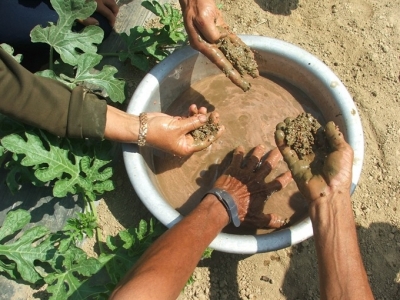Action urged to tackle fake, low-quality fertilisers

Famers shows fake fertiliser dissolving in water. - Photo dantri
HÀ NỘI – Management over the fertiliser market must be enhanced to tackle fake, low-quality products which cause estimated losses of about US$2.5 billion each year for a country with more than 70 per cent of its population working in the farming sector, experts said at an online conference on Wednesday.
Nguyễn Hạc Thúy, Deputy President of the Việt Nam Fertiliser Association, said at the conference held by the Diễn Đàn Doanh Nghiệp (Business Forum) online newspaper that fake and low-quality fertilisers were commonly found and were harming Việt Nam’s agricultural production.
Violations were found to have increased from 4,000 in 2015 to 5,000 cases in 2016 while many cases remained unhandled, Thúy said, adding that stronger deterrents must be used instead of just administrative punishments.
Nghiêm Quang Tuấn from the Department of Plant Protection under the Ministry of Agriculture and Rural Development said that fake fertilisers would decrease productivity of plants, impoverish land and cause unhealthy competition.
“Producers and farmers both hope that fake fertilisers will be wiped out soon,” Vũ Xuân Hồng, deputy director Lâm Thao Fertilisers and Chemicals Joint Stock Company said.
Hồng said that it was urgent to devise standards for fertiliser quality to verify which products were fake or poor quality, adding that many producers sold products without the contents listed on the packaging.
Hồng also proposed market watch to be enhanced together with strong punishment measures.
Nguyễn Hồng Phong, general director of Tiến Nông Agriculture Industry Joint Stock Company, said that it was difficult for buyers to differentiate between fake and genuine products because counterfeiting was very sophisticated and farmers prefer cheaper products.
Phong proposed the Ministry of Planning and Investment boost prerequisites for producing fertilisers, adding that fertiliser producers should have minimum charter capital of VNĐ10 billion (US$438,500).
Experts said that State management agencies must work with producers to tackle fake and poor-quality products, while measures should be taken to help farmers differentiate between genuine and fake products and support them to use fertilisers in a safe way.
Related news
 Sneaky Chinese buyers swaying Vietnam’s pepper prices
Sneaky Chinese buyers swaying Vietnam’s pepper prices The price of pepper in Vietnam has gone up and down recently, allegedly due to unexpected Chinese purchases
 HCM City, Japan’s Hokkaido step up agricultural, aquatic cooperation
HCM City, Japan’s Hokkaido step up agricultural, aquatic cooperation Ho Chi Minh City wants to enhance cooperation with businesses in Japan’s Hokkaido prefecture in agriculture, fishing and high-tech development
 Building trust, from farmer to the consumer plate
Building trust, from farmer to the consumer plate Local smallholders in the food production industry in Vietnam looking to increase their earnings can now benefit from a new low-cost certification scheme